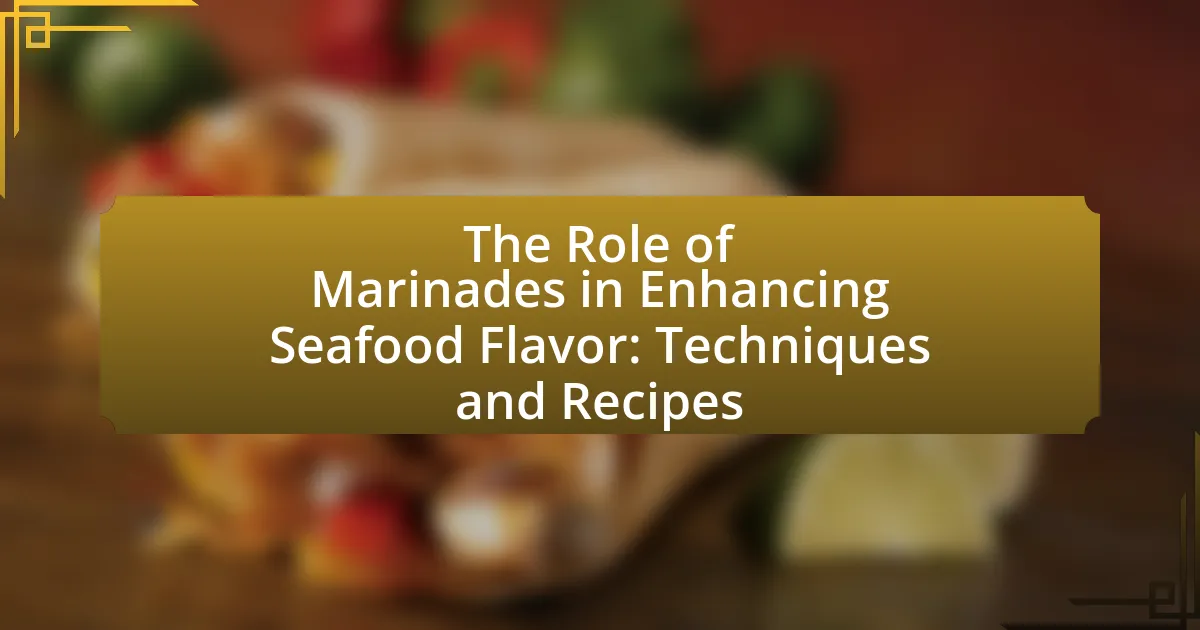Marinades are essential mixtures of acidic ingredients, oils, and seasonings used to enhance the flavor and texture of seafood. This article explores the significance of marinades in seafood preparation, detailing how they improve taste, tenderize proteins, and contribute to food safety by inhibiting harmful bacteria. Key ingredients commonly used in marinades, such as citrus juices, soy sauce, and herbs, are discussed, along with effective marination techniques and optimal marinating times for various seafood types. Additionally, the article provides popular marinade recipes and tips for creating custom blends, emphasizing best practices for achieving flavorful and safe seafood dishes.

What are Marinades and Their Importance in Seafood Preparation?
Marinades are mixtures typically composed of acidic ingredients, oils, and various seasonings used to soak seafood before cooking. Their importance in seafood preparation lies in their ability to enhance flavor, tenderize the protein, and reduce the risk of foodborne pathogens. For instance, the acid in marinades, such as lemon juice or vinegar, breaks down proteins, making seafood more tender while infusing it with flavor. Additionally, marinating seafood for at least 30 minutes can significantly improve taste and texture, as supported by culinary studies that highlight the benefits of marination in enhancing the overall dining experience.
How do marinades enhance the flavor of seafood?
Marinades enhance the flavor of seafood by infusing it with complementary ingredients that penetrate the flesh, resulting in a more robust taste. The combination of acids, such as citrus juice or vinegar, tenderizes the seafood while also allowing spices and herbs to impart their flavors. For example, a marinade containing lemon juice, garlic, and herbs can elevate the natural flavors of fish by balancing acidity with aromatic notes. Studies have shown that marinating seafood can increase flavor absorption by up to 30%, making it a crucial technique in culinary practices.
What ingredients are commonly used in seafood marinades?
Common ingredients used in seafood marinades include citrus juices, soy sauce, olive oil, garlic, herbs, and spices. Citrus juices, such as lemon or lime, provide acidity that helps to tenderize the seafood while adding flavor. Soy sauce contributes umami and saltiness, enhancing the overall taste profile. Olive oil serves as a base that helps to coat the seafood and infuse it with flavor. Garlic adds aromatic depth, while herbs like parsley, dill, or cilantro, along with spices such as black pepper or paprika, further elevate the flavor complexity. These ingredients are frequently combined to create marinades that enhance the natural flavors of seafood.
How do different ingredients affect the flavor profile of seafood?
Different ingredients significantly influence the flavor profile of seafood by introducing various taste elements and enhancing natural flavors. For instance, acidic components like lemon juice or vinegar can brighten the taste and tenderize the flesh, while herbs such as dill or cilantro add aromatic qualities that complement the seafood. Spices like paprika or cayenne pepper contribute heat and depth, altering the overall flavor experience. Additionally, salty ingredients like soy sauce or fish sauce can enhance umami, making the seafood taste richer. Studies have shown that marinating seafood with these diverse ingredients can lead to a more complex and enjoyable flavor profile, as the ingredients interact with the proteins and fats in the seafood, creating a harmonious balance of tastes.
Why is marinating seafood beneficial beyond flavor enhancement?
Marinating seafood is beneficial beyond flavor enhancement because it can improve texture and increase the nutritional value. The acids and enzymes in marinades, such as citrus juice or vinegar, can break down proteins, making seafood more tender. Additionally, marinades often contain ingredients like herbs and spices that provide antioxidants, which can enhance the overall nutritional profile of the dish. For example, a study published in the Journal of Food Science found that marinating fish in a mixture containing lemon juice and herbs significantly increased its antioxidant capacity.
What role does marinating play in food safety?
Marinating plays a crucial role in food safety by inhibiting the growth of harmful bacteria on raw seafood and meats. The acidic components in marinades, such as vinegar or citrus juice, lower the pH, creating an environment that is less conducive to bacterial proliferation. Research indicates that marinating can reduce pathogens like Salmonella and E. coli, as the marinade’s ingredients can possess antimicrobial properties. For instance, a study published in the Journal of Food Protection found that marinating chicken in a vinegar-based solution significantly decreased bacterial counts. Thus, marinating not only enhances flavor but also contributes to safer food handling practices.
How does marinating impact the texture of seafood?
Marinating seafood alters its texture by breaking down proteins and enhancing moisture retention. The acids in marinades, such as vinegar or citrus juice, denature proteins, leading to a more tender texture. Additionally, the salt in marinades helps to draw moisture into the seafood, resulting in a juicier final product. Research indicates that marinating can reduce the firmness of fish and shellfish, making them more palatable and improving the overall eating experience.

What Techniques Can Be Used for Effective Seafood Marination?
Effective seafood marination techniques include using acidic ingredients, such as citrus juices or vinegar, to tenderize and flavor the seafood. Acids break down proteins, enhancing texture and allowing flavors to penetrate. Additionally, incorporating herbs, spices, and aromatics, such as garlic or ginger, can elevate the taste profile. A study published in the Journal of Food Science indicates that marinating seafood for at least 30 minutes can significantly improve flavor absorption and overall palatability. Furthermore, using oil in the marinade helps to create a barrier that locks in moisture during cooking, preventing dryness.
How long should seafood be marinated for optimal results?
Seafood should be marinated for optimal results between 15 to 30 minutes. This time frame allows the flavors to penetrate the seafood without compromising its texture. For example, delicate fish like tilapia or sole benefit from shorter marination times, while firmer fish such as salmon can handle the full 30 minutes. Over-marinating can lead to a mushy texture due to the acidic components in many marinades, which can break down proteins.
What factors influence marinating time for different types of seafood?
Marinating time for different types of seafood is influenced primarily by the type of seafood, its thickness, and the acidity of the marinade. Delicate seafood like fish fillets typically requires shorter marinating times, often between 15 to 30 minutes, to prevent the flesh from becoming mushy. In contrast, denser seafood such as shrimp or scallops can benefit from longer marinating times, ranging from 30 minutes to 2 hours, allowing the flavors to penetrate effectively. The acidity level in the marinade also plays a crucial role; higher acidity can break down proteins more quickly, necessitating shorter marinating periods to avoid over-marinating. For example, a marinade with lemon juice or vinegar will require less time compared to a neutral marinade.
How can over-marinating affect seafood quality?
Over-marinating can significantly degrade seafood quality by causing textural changes and altering flavor profiles. When seafood is exposed to acidic marinades for too long, the proteins begin to break down excessively, resulting in a mushy texture that is unappealing. Additionally, prolonged marination can lead to an overpowering flavor that masks the natural taste of the seafood, diminishing its overall quality. Research indicates that marinating seafood for more than 30 minutes can lead to these adverse effects, as the ideal marination time varies depending on the type of seafood and the marinade’s acidity.
What methods can be employed to apply marinades effectively?
To apply marinades effectively, methods such as soaking, brushing, and injecting can be employed. Soaking involves immersing the seafood in the marinade for a specified duration, allowing flavors to penetrate; typically, this ranges from 30 minutes to several hours, depending on the type of seafood. Brushing the marinade onto the surface of the seafood ensures an even coating and can be repeated during cooking for enhanced flavor. Injecting the marinade directly into the seafood using a syringe allows for deeper flavor infusion, particularly in thicker cuts. These methods are supported by culinary practices that emphasize the importance of time and technique in flavor absorption, ensuring that the seafood is both flavorful and tender.
How does the method of application (brushing, soaking, etc.) impact flavor absorption?
The method of application significantly impacts flavor absorption in seafood. Brushing allows for a more controlled and even distribution of marinade, leading to surface flavor enhancement, while soaking enables deeper penetration of flavors into the flesh, resulting in a more uniform taste throughout the seafood. Studies indicate that soaking can increase flavor absorption by up to 30% compared to brushing, as the marinade can interact with the proteins and fats within the seafood, facilitating a more profound infusion of flavors.
What tools can assist in the marination process?
Tools that can assist in the marination process include mixing bowls, marinating bags, and vacuum sealers. Mixing bowls allow for easy combination of ingredients and thorough mixing of the marinade with the seafood. Marinating bags, often made of durable plastic, provide a convenient way to coat seafood evenly while minimizing mess. Vacuum sealers enhance the marination process by removing air, which helps the marinade penetrate the seafood more effectively, resulting in improved flavor absorption.

What Are Some Popular Marinade Recipes for Seafood?
Popular marinade recipes for seafood include lemon-garlic, soy-ginger, and herb-infused marinades. The lemon-garlic marinade typically consists of fresh lemon juice, minced garlic, olive oil, salt, and pepper, which enhances the natural flavors of fish and shellfish. The soy-ginger marinade combines soy sauce, grated ginger, sesame oil, and honey, providing a savory and slightly sweet profile that complements various seafood types. Herb-infused marinades often feature fresh herbs like parsley, dill, or cilantro mixed with olive oil and vinegar, adding freshness and complexity to the dish. These marinades not only enhance flavor but also help tenderize the seafood, making them a popular choice among chefs and home cooks alike.
What are some classic marinade recipes for fish?
Classic marinade recipes for fish include a variety of combinations that enhance flavor and tenderness. A traditional lemon and herb marinade consists of fresh lemon juice, olive oil, garlic, and herbs like parsley or dill. Another popular option is a soy sauce-based marinade, which combines soy sauce, ginger, garlic, and sesame oil, providing a savory umami flavor. Additionally, a Mediterranean marinade often features olive oil, red wine vinegar, oregano, and crushed red pepper, which complements the natural taste of fish. These marinades not only infuse flavor but also help to tenderize the fish, making them a staple in seafood preparation.
How can citrus-based marinades enhance the flavor of fish?
Citrus-based marinades enhance the flavor of fish by introducing acidity, which brightens and balances the natural flavors of the fish. The citric acid in citrus fruits like lemon and lime helps to tenderize the fish, making it more palatable while also infusing it with zesty notes. Additionally, the aromatic compounds in citrus peels and juices can complement the fish’s flavor profile, creating a more complex taste experience. Studies have shown that marinating fish in citrus can reduce fishy odors and enhance overall flavor, making it more appealing to consumers.
What are the benefits of using herb-infused marinades for seafood?
Herb-infused marinades for seafood enhance flavor, improve texture, and provide health benefits. The infusion of herbs like dill, parsley, and basil introduces aromatic compounds that elevate the overall taste profile of seafood dishes. Additionally, marinating seafood can help tenderize the flesh, making it more palatable. Studies indicate that marinating can also reduce harmful compounds formed during cooking, such as heterocyclic amines, thereby promoting healthier eating. Furthermore, herbs contain antioxidants and anti-inflammatory properties, contributing to overall health benefits when included in meals.
What unique marinades can be used for shellfish?
Unique marinades for shellfish include a citrus-soy marinade, a garlic-herb blend, and a spicy chili-lime mixture. The citrus-soy marinade combines fresh citrus juice, soy sauce, and sesame oil, enhancing the natural sweetness of shellfish while adding umami flavor. The garlic-herb blend typically features minced garlic, fresh herbs like parsley or cilantro, and olive oil, which infuses the shellfish with aromatic flavors. The spicy chili-lime mixture incorporates lime juice, chili paste, and honey, providing a balance of heat and sweetness that complements the brininess of shellfish. These marinades not only enhance flavor but also tenderize the shellfish, making them more enjoyable to eat.
How do Asian-inspired marinades differ from traditional ones?
Asian-inspired marinades differ from traditional ones primarily in their flavor profiles and ingredient compositions. Traditional marinades often emphasize simple combinations of oil, vinegar, and herbs, while Asian-inspired marinades typically incorporate ingredients such as soy sauce, ginger, garlic, sesame oil, and various spices, creating a more complex and umami-rich flavor. For example, soy sauce provides a salty depth, while ginger and garlic add aromatic qualities that are less common in Western marinades. This distinct use of ingredients not only enhances the seafood’s natural flavors but also introduces a variety of textures and aromas, making Asian marinades particularly effective in flavor enhancement.
What are some tips for creating your own seafood marinades?
To create your own seafood marinades, focus on balancing acidity, oil, and flavorings. Use acidic ingredients like lemon juice or vinegar to tenderize the seafood and enhance flavor. Incorporate oils such as olive oil to help distribute flavors and add richness. Additionally, include herbs, spices, and aromatics like garlic, ginger, or dill to elevate the taste profile. For example, a marinade combining lemon juice, olive oil, garlic, and fresh herbs can significantly enhance the flavor of fish or shellfish. This approach is supported by culinary practices that emphasize the importance of acidity and oil in marinades for seafood, which helps in flavor absorption and texture improvement.
What are the best practices for marinating seafood?
The best practices for marinating seafood include using acidic ingredients, limiting marination time, and ensuring even coverage of the marinade. Acidic components like citrus juice or vinegar help to tenderize seafood while enhancing flavor. It is crucial to marinate seafood for a short duration, typically 15 to 30 minutes, to prevent the protein from becoming mushy. Additionally, ensuring that the seafood is evenly coated with the marinade allows for consistent flavor absorption. These practices are supported by culinary guidelines that emphasize the delicate nature of seafood and the importance of balancing flavor and texture.

Leave a Reply